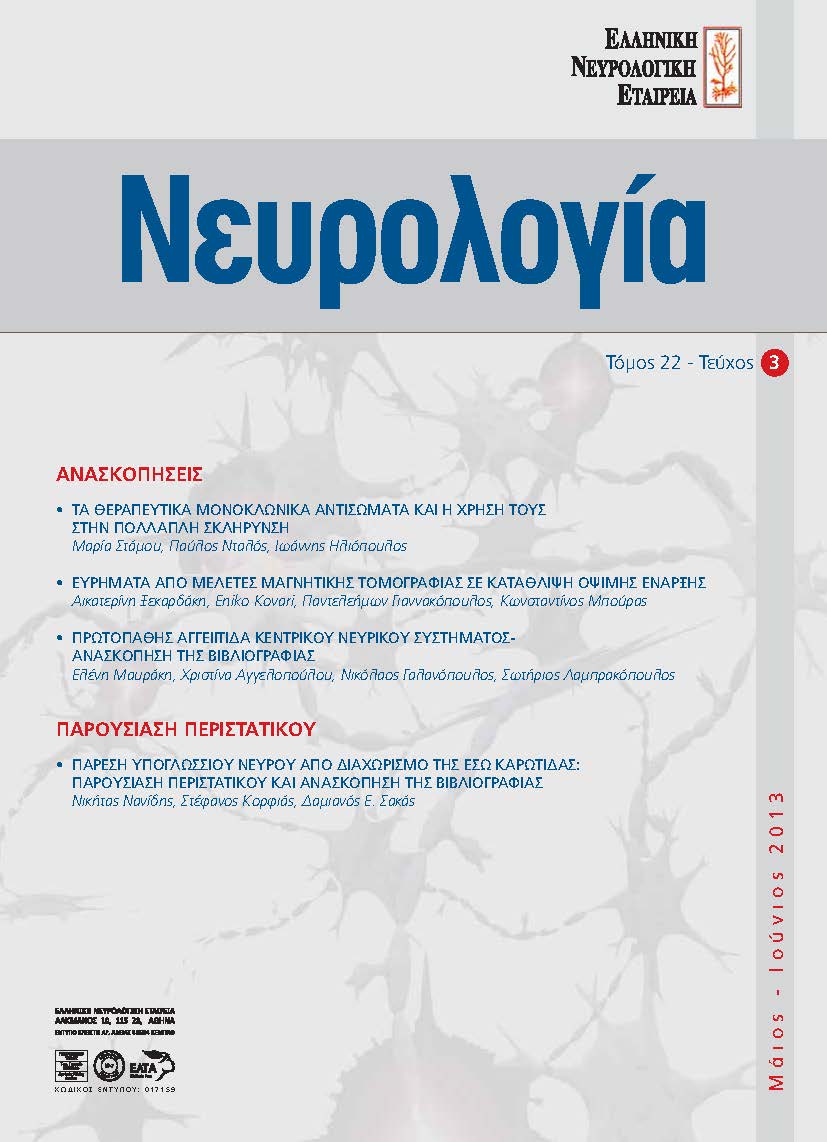Τα θεραπευτικά μονοκλωνικά αντισώματα και η χρήση τους στην πολλαπλή σκλήρυνση
Λέξεις-κλειδιά:
μονοκλωνικά αντισώματα, πολλαπλή σκλήρυνση, daclizumab, natalizumab, alemtuzumab, ocrelizumab, ofatumumab, rituximabΠερίληψη
Η αλματώδης ανάπτυξη της βιοτεχνολογίας έχει οδηγήσει στην παραγωγή μονοκλωνικών αντισωμάτων που
αποτελούν τις νεώτερες θεραπείες νοσημάτων, η παθογένεια των οποίων στηρίζεται σε αυτοάνοσο μηχανισμό. Η εφαρμογή των μονοκλωνικών αντισωμάτων στην αντιμετώπιση της πολλαπλής σκλήρυνσης αποτελεί κομβικό σημείο στην θεραπεία της. Ένα μονοκλωνικό αντίσωμα είναι διαθέσιμo για τη θεραπεία και άλλα
αντισώματα δοκιμάζονται σήμερα σε ασθενείς με πολλαπλή σκλήρυνση. Ωστόσο, η χορήγηση αυτών των
μορφών θεραπείας ενέχει τον κίνδυνο ανοσολογικών αντιδράσεων όπως οξεία αναφυλαξία, λοιμώξεων,
και αυτοάνοσων παθήσεων. Επιπλέον, εξαιτίας ελλιπών γνώσεων μας για το ανοσοποιητικό σύστημα προέκυψαν απροσδόκητες συνέπειες όπως για παράδειγμα, το natalizumab ένα μονοκλωνικό αντίσωμα έναντι
α4-ιντεγκρίνης των λευκοκυττάρων, αυξάνει τον κίνδυνο ανάπτυξης προοδευτικής πολυεστιακής λευκοεγκεφαλοπάθειας, χωρίς να προκαλεί αξιοσημείωτη ανοσοκαταστολή. Σε αυτή την εργασία γίνεται μια ανασκόπηση των βασικών ανοσολογικών και φαρμακολογικών ιδιοτήτων των μονοκλωνικών αντισωμάτων και της
τρέχουσα κλινικής εφαρμογής και ανάπτυξης αυτών στην πολλαπλή σκλήρυνση, με έμφαση στην αποτελεσματικότητα και την ασφάλεια.


